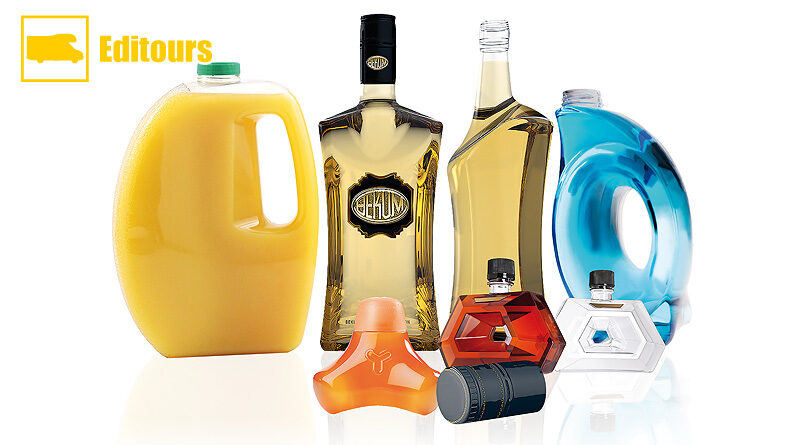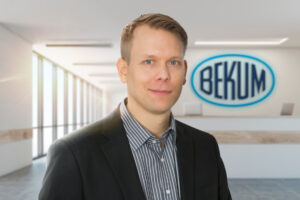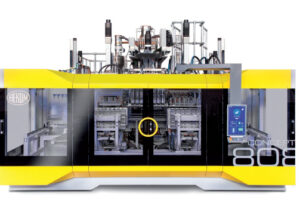‘Ich bin ein Berliner’
Extrusion blow moulding machines from the German capital – Interview with Bekum Maschinenfabriken GmbH
Bekum Maschinenfabriken GmbH has its headquarters on an industrial estate in the south of Berlin’s Tempelhof-Schöneberg district. It is an original Berlin company and after more than 60 years of its existence, the world of extrusion blow moulding has long been unimaginable without it. Founded in 1959 by Gottfried Mehnert, the company remains family-run and has trodden a continually successful path, delivering various important inventions and patents. When it all started, the still new company became a talking point with its development of the first ring neck calibration. This was followed in 1963 by the first double-station blow moulding machine in the world and then, 13 years later, the first blow moulding machine for six-layer coextrusion. Full order books in the Berlin Wall era and the resulting expansion restrictions in the city led to the establishment of the Traismauer site in Austria in 1968. In 1979, another site was added in Williamston, Michigan, USA, to serve the North American market. But Berlin always remained the nerve centre and beating heart of Bekum, uniting the departments for Sales, Customer Service, Design and Development. The upcoming generation of the entrepreneurial family is ready in the starting blocks to secure the company in the long term. A reason for us to drop into the company’s headquarters.
With its machinery and systems, Bekum serves both the food and beverage industry and various non-food sectors, such as the automotive and pharmaceutical industries. The manufacturer has recorded growth of over 10% annually in the years 2019 to 2022 and has managed to take advantage of supply shortages in other engineering firms caused by the pandemic and achieve record sales. Currently, its principal markets are in the packaging sector with handleware bottles for food and beverage. Interview partner Christian Richard, Sales Administration & Corporate Communications Manager at Bekum, has been with the company for more than 27 years and is almost part of the furniture. As an introduction, he told us the history of the company sites: “Back in 1968, with business booming and the Berlin Wall looming nearby, we had to come up with some way to expand. The solution was in Traismauer, Austria, where industrial areas and qualified employees for the further development and production of machine parts were available. With the growing product range, capacities in Traismauer increased, where in the course of time complete large blow moulding machines of our Large Blow Moulder series “BA” started. Traismauer’s full responsibility for the development and production of the BA series was finally taken over in 1994.
In addition, at Traismauer, there is a state-of-the-art mechanical in-house and job-order manufacturing facility, which supplies a comprehensive range of flexible and precision manufacturing activities. After significant investments, since 2015, the complete Bekum production capability for the European market has been located there.” With the expansion into the American market in Williamston in 1979, there was finally synergy between German technology and American entrepreneurial spirit, which led to an independent product range. “It was more than just a simple adaption of a German machine for the market there,” explained Mr Richard. “The Americans successfully established their own machine line. The sense of responsibility of a family business is always present in the US: for example, Bekum America depends strongly on their own apprenticeship program. Today around half of the manufacturing employees come from this program.”
The group has around 350 employees in total; 50 in Berlin, 150 in Traismauer and 150 in Williamston. “Our 60-year company philosophy sets us apart, as well as the specialist staff that implement it. It enables us to get close to our customers both in person and digitally. Alongside our own sites, we also have more than 30 local sales offices and onsite service centres with appropriate spare parts stores to accelerate processing and service.
Careful expansion of the PET business
Besides Bekum’s machines and equipment for processing various thermoplastics, the PET sector is also being carefully expanded – its current contribution to overall turn-over is still under 10%. In the past few years, there have been various projects in this field, such as the successful production of handleware bottles for juice bottler POM Wonderful in 2005 using Eastman’s copolyester EB062, and a bottle for Coca-Cola in 2007, which helped the EB062 achieve its breakthrough. Christian Richard explained: “Packaging trends, which we support with our equipment, often place global food and drinks manufacturers in the premium sector, and the same is true for PET. One example is fresh juices from the chiller, where marketing at POS is also guided by the premium packaging.”
New applications of PET carry handle packaging
The beating heart of a finished PET bottle like this, the “C-frame closing” unit, was reported as a patent by Bekum in 2010 for electric and hydraulic blow moulding machines. It was to simplify the processing of copolyester and PET and can be found in the models of the Eblow and Hyblow ranges. In 2019, the new System Concept 808 was presented, which was to combine improved plastification while simultaneously saving energy, an interactive user interface and the option to manufacture multi-layer packaging, alongside the use of the C-frame and a revised design feature including a quick-change system for moulds. “This year, in 2022, over 40 extrusion blow moulding machines will make PET bottles with handleware,” continues Mr Richard. “New applications in the field of PET carry handle packaging are currently being developed. We are seeing even greater growth here.”
Besides food and beverage, non-food sectors are also being kept in view, where customers do not want to do without the brilliant appearance of PET. The current best-selling machines are the models Eblow/Hyblow 607D 2×3-fold and 407D 2×2-fold. “PET handleware bottles need excellent clamp performance, which we deliver with the C-frame. The design of the C-frame, which utilises mould platens that move along precise, low-friction linear guides, enables completely symmetrical clamp force distribution along the entire mould area, while maintaining high parallelism of the mould platens. The full clamp force is available independent of the mould thickness without adjustment. A precise clamp force distribution during the clamping process results in ideal article weld formation.”
Besides the initial successful business years mentioned above, the pandemic years have also given the company a boost in terms of service development. “We have expanded everything relating to digitalisation in day-to-day business as regards customer interaction and the remote maintenance of machines.” In other ways too, they are doing a great deal and equipping themselves further for the future, for example in the processing of rPET, where successes have been reported in various test runs. “This is one of the many topics we’re tackling. Just last year, we expanded our site in Williamston with a 3,700 m2 production hall so we can keep up with the increased demand for machines. At this year’s K trade fair, we will be presenting our new equipment and new technologies to the public.”



